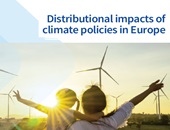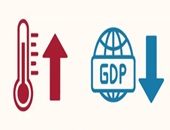What is the Cost of Biodiversity?
Biologists have long known that biodiversity is the key to nature’s resilience. In a biodiverse world, if the environment changes and some organisms can no longer thrive, others can take their place and fulfil functions that are essential to the species’ survival, and ultimately, human survival. Even the lowliest animals play significant roles, such as insects that pollinate—and a third of the food we eat depends crucially on insect pollinators. In addition to its intrinsic value, biodiversity underpins ecosystem services, providing the backbone of the global economy. Biodiversity loss, or the reduction in the genetic diversity of life forms, can […]
The Case for CBAM
In 2003, a devastating heat wave in Europe killed an estimated 70,000 Europeans, many of them elderly people living alone. This, and a series of other extreme weather events, have persuaded many countries to take climate change seriously. The European Union enacted the carbon border adjustment mechanism (CBAM). It came into effect as of October 1, 2023, and is designed to account for the carbon cost of producing imported goods, with the ultimate aim of reducing greenhouse gas emissions. “I’m a huge fan of CBAM,” Catherine Wolfram, professor of economics at MIT Sloan, said, joking that the name sounded like something […]
Distributional consequences
Climate change marches on. To prepare for worse storms, droughts, and wildfires, the infrastructure must be improved. Governments have different ways to handle the costs of adapting to climate change. How will these additional costs be borne? “Transition to a carbon-neutral economy is at the top of the policy agenda around the globe,” said Moritz Kuhn, professor of economics at the University of Mannheim. Private households account for about two-thirds of carbon emissions. “Governments can introduce policies to speed up the adoption of green technologies,” he said, but the heterogeneity of consumption and carbon emissions could present problems. These will […]
How Much Will Global Warming Cool Global Growth?
More workers than ever before are being exposed to heat stress worldwide, according to a 2024 report. Heat stress has a knock-on effect for productivity and thus the gross domestic product (GDP). How much does a permanent rise in temperature decrease the GDP? Economists have tried to estimate the size of the climate change effect, in variously affected countries, with different models and different assumptions. “There’s a wide divergence in projections of how the GDP will change depending on climate change,” said Valery Ramey, Senior Fellow at Hoover Institution and Research Associate at National Bureau of Economic Research (NBER). She was […]
Investing? Climate Matters
How will climate change affect investment decisions, going forward? Are investment professionals well informed on climate risk and transition risk? “Around the world, nations are committing to net-zero emissions targets of greenhouse gases,” said Richard MacGillivray, Senior Director at CFA Institute. “What are the implications of these commitments for the value and performance of companies in the real economy?” The 2024 Global Risks Report tabled by the World Economic Forum (WEF) polled risk managers on the biggest global threat to sustainability. Over the next two years, respondents said the top risk is misinformation and disinformation. However, over the next ten […]
Resilience and Development
For developing countries, how will climate change affect the progress of their economic development? Will these countries be able to use available opportunities through institutions such as the World Bank to adapt to changing conditions and improve people’s lives? “Development and resilience are mutually reinforcing,” said Stéphane Hallegatte, Senior Climate Change Adviser at the World Bank. “Development contributes to resilience, and resilience is crucial for safeguarding gains from increasingly frequent crises.” He was speaking at a webinar on September 5, 2024, on economic development in a changing climate. This was part of the series of talks sponsored by the Federal Reserve Bank […]
Immigration Spike Eases Labor Shortage
For accurate predictions, models depend on accurate input data. For this reason, the U.S. Congressional Budget Office (CBO) routinely updates demographic information about the United States. Recently, errors on the orders of millions of people have come to light. Why are the estimates of the number of immigrants off base, and what are the effects on economic planning? “The CBO now projects that 3.3 million people on net immigrated to the United States in both 2023 and 2024,” according to an economic letter released by the Federal Reserve Bank of San Francisco (FRBSF) on July 15, 2024. “These estimates are […]
AI, ESG, and 1.5 Degrees
Moving to a sustainable future on a global scale is challenging. The United Nations Environment Program (UNEP) was founded to encourage member nations to develop sustainability agendas. Through their Financial Initiative (UNEPFI), the UN plans to harness the power of the financial system to this end as well. How can banks, insurers, and investors help accelerate sustainable development? How can they manage transition risk, namely the collection of non-physical risks associated with the transition to environmental sustainability? Does artificial intelligence (AI) have any role to play? In 2015, the Financial Stability Board created the Task Force on Climate Related Financial […]
The Cost of Sustainability
It seems not a newscast goes by without mention of carbon taxes, or emissions trading, or severe weather events. As wildfire season ramps up, the benefits to switching to renewable energy are apparent. Gradually—some might say too gradually—climate policy (both to mitigate and adapt to changing conditions) is being implemented. New measures chiefly target industry sectors that have the greatest carbon emissions, such as fossil fuels, agriculture, and fashion. But how does sustainability affect the cost of capital, in other words, the minimum rate of return a company must earn before generating value? “There’s plentiful research on the benefits,” said […]
Tax or Cap?
Carbon tax or cap and trade? These are terms bandied about in the political arena as countries decide how to address global warming. “There is a clear consensus among economists,” said Roger Gordon, professor of economics at University of California at San Diego, “that the best way to address global warming is through the global use of a carbon tax on CO2 emissions.” On January 18, 2024, he was speaking at a webinar as part of the biweekly series of talks, titled the Virtual Seminar on Climate Economics, sponsored by the Federal Reserve Bank of San Francisco (FRBSF). “With a carbon tax,” […]










